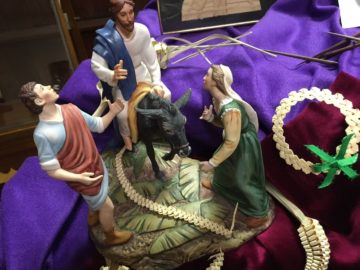As we anticipate Holy Week, Fr. Paul Gallagher, OFM offers a Scriptural Reflection for Palm Sunday of the Lord’s Passion. This content is edited by Franciscan Sister of Christian Charity Sister Anne Marie Lom and Joe Thiel. The excerpts from the Sunday readings are prepared by Joe Thiel. To read or download the complete pdf with excerpts for your prayer, please click here Franciscan Gospel Reflection March 28 2021 Excerpts are from the Lectionary for Mass for Use in the Dioceses of the United States of America, second typical edition © 2001, 1998, 1997, 1986, 1970 Confraternity of Christian Doctrine, Inc., Washington, DC. Used with permission. All rights reserved. No portion of this text may be reproduced by any means without permission in writing from the copyright owner.
Mark 14:1-15:47
Chapter 14
The Passover and the Feast of Unleavened Bread were to take place in two days’ time. So the chief priests and the scribes were seeking a way to arrest him by treachery and put him to death. They said, “Not during the festival, for fear that there may be a riot among the people.” Click here for the complete Passion.
Background:
Scripture scholars believe that the passion accounts as continuous narratives existed before they were incorporated into the gospels. They were probably written for use in liturgical gatherings of the early Christians. Some believe that Mark’s narrative is drawn from two different accounts that he combined and wove together to form his own account. The earliest account would have drawn on Old Testament texts of Psalm 22 and Isaiah 53. This account tried to understand how an innocent servant of God would suffer the humiliation of death by crucifixion. This early account points to these two ancient texts to demonstrate that this kind of death is what has been foretold. The second early account of the crucifixion presents a conflict between the power of light and the power of darkness. Here, Jesus’ cry in agony on the cross is the cry of victory of the power of light. It is at this moment that the temple curtain is torn in two, and all that separates the created world from the divine is breached. Mark’s account of the passion does not support one understanding of the passion over the other, but rather it draws on both to create his narrative.
In order to reflect on the passion of Jesus, it might be helpful to note that our contemporary attitude toward pain may be very different from that of the people at the time of Jesus, and those for whom the gospel was originally written. They lived with much more pain in their daily lives than most Westerners would find tolerable. They presumed that living life meant enduring pain; the more important question in their culture was how one handled it.
Jesus accepts the pain in his life with a great deal of composure. Mark portrays Jesus as human; Jesus would like to avoid the pain and the humiliation of these events, but he will remain faithful to his relationship to God. For the first time in this gospel, he acknowledges publicly that he is the Messiah (Mark 14:62). By doing so, he seals his death and all that it will mean.
In contrast to Jesus’ faithful acceptance of the consequences of his relationship to God, Mark portrays the disciples as totally unwilling and unable to be faithful to their relationship to Jesus. Judas betrays him; Peter, James and John fall asleep when he asks them to accompany him at Gethsemane, and Peter outright denies that he even knows Jesus. They all drank of the cup that contained the blood of the new covenant, and they joined Peter in proclaiming their fidelity when Jesus told Peter he would deny him (Mark 14:23 & 31). Nonetheless they all fell asleep and deserted him.
Mark frames the passion with faithful women at both the beginning and the end of the account. In the first verses of this text, one of them anoints Jesus in the same manner that a prophet would be anointed. She not only recognizes who he is, but also prepares his body for burial. Also, she prepares us to hear about these final events. At the end of the passion text, the women are present. They have stayed by Jesus’ side through these painful and humiliating events. Two of them, Mary Magdalene and Mary the mother of Joses, even follow as Jesus’ dead body is taken to the tomb. They watch as Joseph of Arimathea rolls the stone to seal the entrance to the tomb of the beloved person whom they had followed and to whom they had ministered.
From the perspective of the non-believer, Jesus is portrayed as one who is totally betrayed and stripped of any honor. The pain is real, but the greater burden is the total lack of esteem. Crucifixion was intended by the Romans to be both painful and humiliating. It was a death that dragged out over hours and the victim was even given wine with some drugs so that he would not faint. The person was stripped naked, totally exposed, so that at the time of death when his bowels would be loosened, it would create a public image of denigration and humiliation. It should be no surprise that the disciples, in the hours and days after these events, did not know how to deal with this image of Jesus crucified, given their belief and hope that he might be the Messiah.
At the moment of Jesus’ death, the curtain in the temple was torn in two. The curtain created the Holy of Holies, the dwelling place of God. Only the High Priest could enter, and then only once a year to offer sacrifice to God. The curtain separated God from the people. Torn in two, it no longer functioned as a wall to set God apart from his people.
Jesus dies between two criminals who like himself were crucified for their crimes. It is not James and John who are at his right and left when he comes into his kingdom. No, that place was given to two criminals.
Reflection Questions:
- Where are the places where you have experienced pain in your life, either physical, emotional, or spiritual? What was most important to you during those times?
- Do you respond to pain that is a result of your own choices differently than that which comes from the circumstances of your life, or is inflicted on you by someone else?
- Who are the people who have stood by you during some period of difficulty?
- Have you ever wished that you could suffer pain in the place of another?
- Mark’s portrayal of the disciples is not very flattering. Why do you think he includes their actions in his gospel?
- Why do you think Mark, who is writing for such a male-dominated society, places the women in such a positive light?
- Take some time to talk with God openly about whatever it is that strikes you most personally in this gospel. Share with Him your thoughts and questions, and also how you feel within about the way Mark has recorded the events of the passion of Jesus.




